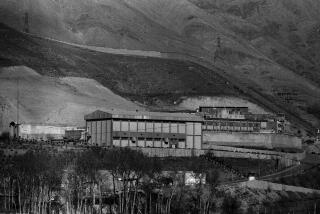Hostages Were a Key Reason for Arms Sale, McFarlane Says : But He Stresses Hopes of Improved Ties With Iran
- Share via
WASHINGTON — Former National Security Adviser Robert C. McFarlane told Congress today that the American hostages in Lebanon were a key reason for U.S. arms sales to Iran but that the Administration had realistic hopes the risky overture would lead to better relations with Tehran.
Testifying before the Senate Foreign Relations Committee, McFarlane said the United States realized that to achieve those objectives, it had to deal in weapons--the only currency acceptable to Iran, mired in its 7-year-old war with Iraq.
Seated alone at the witness table, his attorney stationed behind him, McFarlane discussed for two hours and 15 minutes the U.S. goals and operations in opening new avenues to so-called moderates in the radical Islamic government of the Ayatollah Ruhollah Khomeini.
His appearance came a day after new, detailed descriptions of McFarlane’s secret May 28 mission to Tehran, during which he, Lt. Col. Oliver L. North and other U.S. officials negotiated for four tense days in top-floor suites at the Tehran Hilton to buy the release of the American hostages in Lebanon.
Iranian Offered Deal
ABC News obtained detailed accounts of the bargaining, in which a key Iranian official, identified as Hadi Najafadabi, pleaded with McFarlane to accept the release of two hostages that day and two more the next.
The Iranians were displeased that the plane that brought McFarlane and his party contained only a partial arms shipment. McFarlane, ABC News reported, refused to dicker and insisted the four Americans be released immediately. When the Iranians refused, the Americans left.
In his committee testimony today, McFarlane said for the first time that President Reagan gave the go-ahead for the entire operation in a July, 1985, telephone conversation. Reagan, McFarlane said, granted “specific authority to another country to do something.” The other country was Israel.
“I said, ‘Mr. President, you know your secretaries of state and defense have stated their opposition to this,’ ” McFarlane said.
“ ‘Again, I understand that,’ ” he quoted Reagan as saying.
Talk With ‘Sensible Elements’
McFarlane said the secret policy was planned to restore “some kind of discourse with sensible elements in Iran,” and, “for this concept to have any validity, the people with whom we dealt could not be people of no consequence in the government.
“They needed to be people that could change things. A measure of that at the outset had to be, could they in fact effect the release of the hostages. If they couldn’t even do that, we couldn’t expect the larger aspects of changing Iranian policy could be taken on.”
McFarlane left his White House job in December, 1985, but remained heavily involved in the policy through 1986. The revelation of his May trip to Iran--leaked in November to a pro-Syrian publication in Lebanon by Iranian officials opposed to the dealings with the United States--touched off the foreign policy scandal that has shaken the Administration.
The Senate Foreign Relations Committee heard from McFarlane in its capacity as overseer of U.S. foreign policy. Its inquiry will hear from several Administration officials in the coming weeks, including Secretary of State George P. Shultz, Atty. Gen. Edwin Meese III and acting CIA Director Robert Gates, who is running the spy agency while Director William J. Casey recovers from his Dec. 18 brain surgery.
In addition, two Watergate-style select committees will begin probes next month into the scandal, including the diversion of arms sales profits to contras. A special prosecutor also is investigating the globe-girdling affair.
More to Read
Sign up for Essential California
The most important California stories and recommendations in your inbox every morning.
You may occasionally receive promotional content from the Los Angeles Times.










